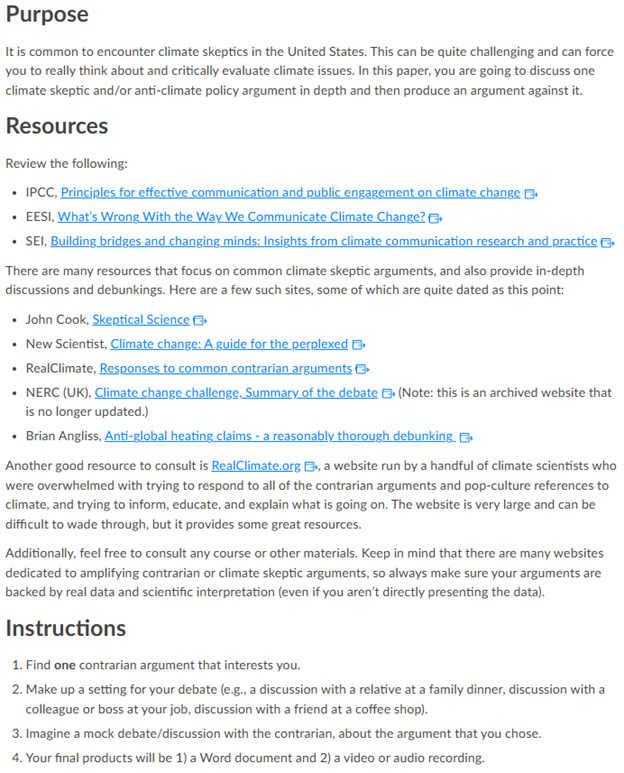Imagining a Mock Debate with a Climate Skeptic
Overview
Students choose an argument devised by a climate skeptic, analyze it in depth, and develop an argument against it to present in a mock debate.
Why Use This?
This activity helps students feel more confident discussing complex and sometimes controversial topics like climate change. It also helps them understand how an issue is perceived differently depending on the audience and the role communication plays in shaping public understanding of an issue.
How Does It Work?
Students are given resources that present arguments made by climate skeptics. They are then asked to imagine a scenario where they would engage in conversation with an actual person who holds these beliefs. In envisioning this scenario, they are asked to establish a setting for the debate and formulate an argument to refute the skeptic’s claims. At the end of the activity, they submit a video of themselves verbally presenting their argument and a written description of the issue.

It is common to encounter climate skeptics in the United States. This can be quite challenging and can force you to really think about and critically evaluate climate issues. In this paper, you are going to discuss one climate skeptic and/or anti-climate policy argument in depth and then produce an argument against it.
Resources
Review the following:
• IPCC, Principles for effective communication and public engagement on climate changeLinks to an external site.
• EESI, What’s Wrong With the Way We Communicate Climate Change?Links to an external site.
• SEI, Building bridges and changing minds: Insights from climate communication research and practiceLinks to an external site.
There are many resources that focus on common climate skeptic arguments, and also provide in-depth discussions and debunkings. Here are a few such sites, some of which are quite dated as this point:
• John Cook, Skeptical ScienceLinks to an external site.
• New Scientist, Climate change: A guide for the perplexedLinks to an external site.
• RealClimate, Responses to common contrarian argumentsLinks to an external site.
• NERC (UK), Climate change challenge, Summary of the debateLinks to an external site. (Note: this is an archived website that is no longer updated.)
• Brian Angliss, Anti-global heating claims – a reasonably thorough debunking Links to an external site.
Another good resource to consult is RealClimate.orgLinks to an external site., a website run by a handful of climate scientists who were overwhelmed with trying to respond to all of the contrarian arguments and pop-culture references to climate, and trying to inform, educate, and explain what is going on. The website is very large and can be difficult to wade through, but it provides some great resources.
Additionally, feel free to consult any course or other materials. Keep in mind that there are many websites dedicated to amplifying contrarian or climate skeptic arguments, so always make sure your arguments are backed by real data and scientific interpretation (even if you aren’t directly presenting the data).
Instructions
1. Find one contrarian argument that interests you.
2. Make up a setting for your debate (e.g., a discussion with a relative at a family dinner, discussion with a colleague or boss at your job, discussion with a friend at a coffee shop).
3. Imagine a mock debate/discussion with the contrarian, about the argument that you chose.
4. Your final products will be 1) a Word document and 2) a video or audio recording.
Keep In Mind
Make sure you are flexible with how students approach the activity. In this course, several students wanted to debate a specific policy example versus a purely skeptical argument. As long as there was a scientific basis for their debate about the policy, it was still effective.